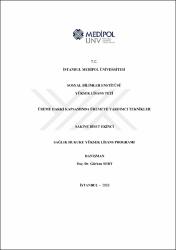| dc.contributor.advisor | Sert, Gürkan | |
| dc.contributor.author | Biset Ekinci, Sakine | |
| dc.date.accessioned | 2021-07-06T06:28:26Z | |
| dc.date.available | 2021-07-06T06:28:26Z | |
| dc.date.issued | 2018 | en_US |
| dc.date.submitted | 2018-09-26 | |
| dc.identifier.citation | Biset Ekinci, S. (2018). Üreme hakkı kapsamında üremeye yardımcı teknikler. (Yayınlanmamış yüksek lisans tezi). İstanbul Medipol Üniversitesi Sosyal Bilimler Enstitüsü, İstanbul. | en_US |
| dc.identifier.uri | https://hdl.handle.net/20.500.12511/7467 | |
| dc.description.abstract | Teknolojinin gelişimi tıp bilimine de yansımış ve doğal yollardan çocuk sahibi olamayan kişilerin çocuk sahibi olabilmesine imkan doğmuştur. Yapay döllenme şekli olan üremeye yardımcı teknikler, çocuk sahibi olamayan kişilere her ne kadar umut olmuşsa da ahlaki ve etik kaygılar, hukuki sorunlar devletleri bu konuda belli sınırlar getirmeye yönlendirmiştir. Çalışmamızda bahse konu teknikler, hukuki ve etik tartışmalar, yasal düzenlemeler ile belirlenen sınırlamalar açıklanmıştır. Tıbbi bir müdahale olan üremeye yardımcı tekniklerin hukuka uygun şekilde uygulanabilmesi için gerekli olan şartlara değinilmiştir. Üreme hakkı kapsamında, üremeye yardımcı tekniklere ilişkin her türlü bilgi edinme ve bilimsel gelişmelerden yararlanma hakkı olan bireylerin, sağlık hizmetlerinden eşit şekilde yararlanabilmesi konusu, uluslararası hukuk metinleri bağlamında incelenmiş ve sınırlı kaynakların tahsisi bağlamında değerlendirilmiştir. | en_US |
| dc.description.abstract | Developed technology has been reflected to the medical science, and it became possible that people who are unable to have children with natural ways can have children. Although assisted reproductive techniques have given hope to people who can not have children, moral and ethical concerns, and legal problems have made States to bring certain limitations to this issue. In this study, assisted reproductive techniques, legal and ethical discussions and limitations are scrutinized conjunction with legal regulations. Also, required law conditions for the application of assisted reproductive techniques which are medical interventions are mentioned. Within the scope of the right to reproduction, the issue of equitable access to health services by individuals who are entitled to all kinds of information and scientific advances in assisted reproductive techniques are examined in the context of international regulations and evaluated in the context of limited resources. | en_US |
| dc.language.iso | tur | en_US |
| dc.publisher | İstanbul Medipol Üniversitesi Sosyal Bilimler Enstitüsü | en_US |
| dc.rights | info:eu-repo/semantics/openAccess | en_US |
| dc.subject | Üremeye Yardımcı Teknikler | en_US |
| dc.subject | Yapay Döllenme | en_US |
| dc.subject | Homolog Döllenme | en_US |
| dc.subject | Heterolog Döllenme | en_US |
| dc.subject | Tıbbi Müdahale | en_US |
| dc.subject | Üreme Hakkı | en_US |
| dc.subject | Cinsel Sağlık ve Üreme Sağlığında Haklar | en_US |
| dc.subject | Assisted Reproductive Techniques | en_US |
| dc.subject | Artificial Insemination | en_US |
| dc.subject | Homologue Insemination | en_US |
| dc.subject | Heterologuos Insemination | en_US |
| dc.subject | Medical Intervention | en_US |
| dc.subject | Right to Reproduction | en_US |
| dc.subject | Sexual Health and Reproductive Health Rights | en_US |
| dc.title | Üreme hakkı kapsamında üremeye yardımcı teknikler | en_US |
| dc.title.alternative | Within the scope of the right to reproduction, the issue of access to health services | en_US |
| dc.type | masterThesis | en_US |
| dc.department | İstanbul Medipol Üniversitesi, Sosyal Bilimler Enstitüsü, Sağlık Hukuku Ana Bilim Dalı | en_US |
| dc.relation.publicationcategory | Tez | en_US |


















